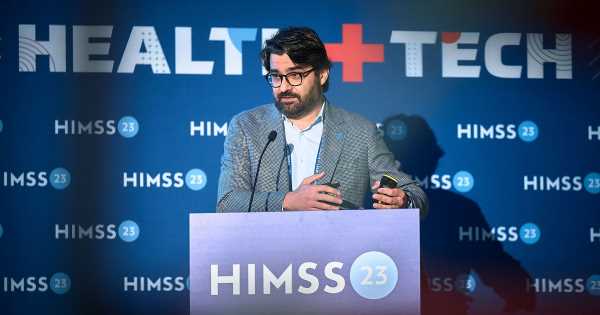
Photo: HIMSS/Ard Jongsma
Policymakers and senior advisors from across the globe gathered in Lisbon yesterday (7 June) to receive coaching on digital health.
The training was part of a series of workshops held jointly by the HIMSS and the World Health Organisation European regional office (WHO/Europe), aimed at paving a harmonised approach to the digital transformation of health systems in Europe and beyond.
Representatives were present from the 53 WHO European region member countries, which cover a vast geographical region from the Atlantic to the Pacific oceans.
During the session at the HIMSS23 European Health Conference and Exhibition, attendees discussed how to design country-level action plans with measurable outcomes and identify current strategic assets to advance digital health.
WHY IT MATTERS
The workshop aligns with HIMSS’ commitment to strengthening the skills of a diverse digital health workforce and several ongoing efforts, including the Global Public Policy Principles, support for the European Health Data Space (EHDS) and the work of the Digital Health Advisory Group for Europe (DHAGE).
THE LARGER CONTEXT
HIMSS and WHO/Europe cosigned a landmark Memorandum of Understanding (MoU) in September 2022, with the intention of launching a transatlantic digital health coalition to help member countries assess their progress with digital health transformation.
The MoU supports implementing the regional digital health action plan for the WHO European region 2023-2030 that was endorsed by WHO European region member countries in September last year.
WHO/Europe and HIMSS have also co-designed a senior health leaders orientation programme for digital health, which will feature a series of three workshops to build knowledge and capacity for developing and managing national data and digital health ecosystems.
ON THE RECORD
Tom Leary, HIMSS Senior vice president and head of government relations, said: “The workshop has helped identify where the countries are on their digital health journey — whether they’re brand new to it, they’re in the middle of it, or are very advanced. We can help them identify the market suppliers and who they can talk to, these nuance issues, to get them the absolute highest level that they can achieve, given the resources each nation has.”
David Novillo Ortiz, PhD, regional adviser on Digital Health at WHO/Europe, said: “This workshop has been useful to take stock of the progress achieved so far by these countries, but also have an open discussion on the challenges ahead of us. We need to be more open about how we address weak points in our shared efforts to integrate digital tools into healthcare, mainly related to better monitoring of digital health for policy decision-making and ensuring that we use digital solutions without leaving anyone one behind.”
Source: Read Full Article